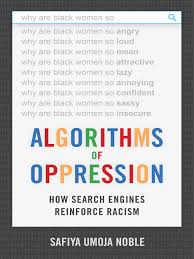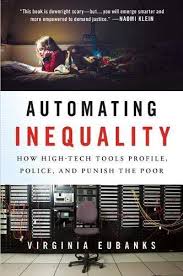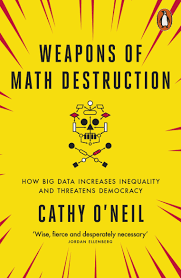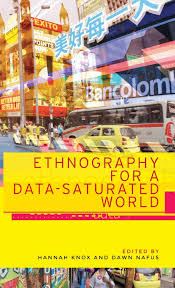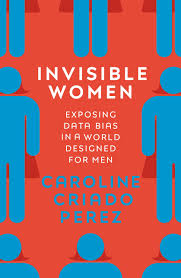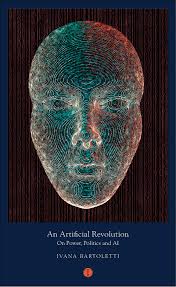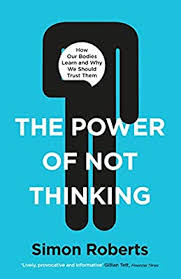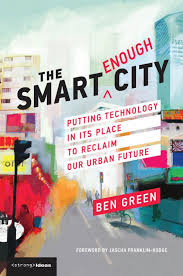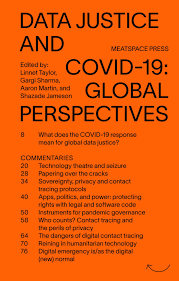Our recommended reads for 2020
Last year we served up a selection of books in our 2019 Delegate Pack, relevant to the conference theme, socially-responsible AI. What follows are our recommended reads for 2020: how emerging technologies reinforce white supremacy and deepen social inequality (Benjamin), how search algorithms privilege whiteness and discriminate against people of colour, specifically women of colour (Noble), discriminate against the poor (Eubanks), how mathematical models aren’t as objective as you might think (O’Neil), and the exclusion of half the population by design (Criado Perez).
Ethnography is reimagined and extended for a data-saturated world (Knox and Nafus), and data science and data ethics is informed by intersectional feminist thought (D’Ignazio and Klein). There’s an essential primer to understand the intersection of technology and geopolitical forces (Bartoletti), and an important book about why Big Data doesn’t have all the answers (Roberts), why cities should strive to be “smart enough” (Green), and an examination of the landscape of technologies deployed globally during the pandemic (Taylor et al).
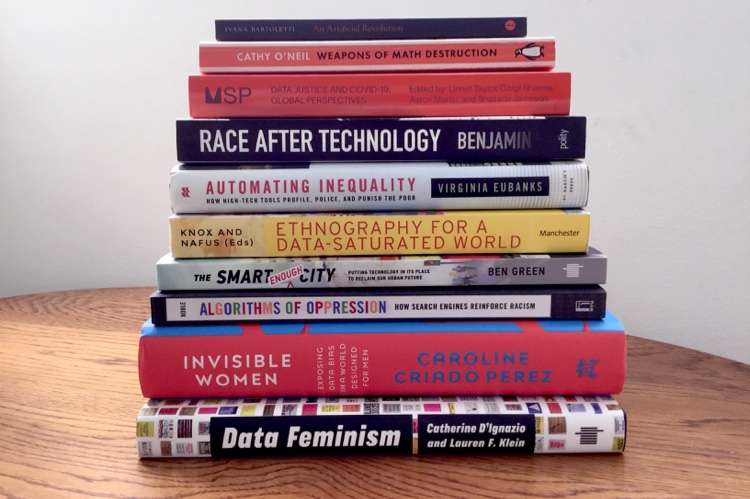
Race after Technology by Ruha Benjamin
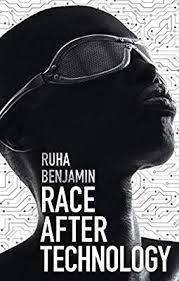
Algorithms of Oppression by Safiya Umoja Noble
Safiya Umoja Noble challenges the idea that search engines like Google offer an equal playing field for all forms of ideas, identities, and activities. Data discrimination is a real social problem; Noble argues that the combination of private interests in promoting certain sites, along with the monopoly status of a relatively small number of Internet search engines, leads to a biased set of search algorithms that privilege whiteness and discriminate against people of color, specifically women of color.
Through an analysis of textual and media searches as well as extensive research on paid online advertising, Noble exposes a culture of racism and sexism in the way discoverability is created online. As search engines and their related companies grow in importance—operating as a source for email, a major vehicle for primary and secondary school learning, and beyond—understanding and reversing these disquieting trends and discriminatory practices is of utmost importance. Algorithms of Oppression contributes to our understanding of how racism is created, maintained, and disseminated in the 21st century.
Automating Inequality by Virginia Eubanks
Since the dawn of the digital age, decision-making in finance, employment, politics, health and human services has undergone revolutionary change. Today, automated systems—rather than humans—control which neighbourhoods get policed, which families attain needed resources, and who is investigated for fraud. While we all live under this new regime of data, the most invasive and punitive systems are aimed at the poor. Eubanks systematically investigates the impacts of data mining, policy algorithms, and predictive risk models on poor and working-class people in America.
Digital tracking and automated decision-making hide poverty from the middle-class public and give the nation the ethical distance it needs to make inhumane choices: which families get food and which starve, who has housing and who remains homeless, and which families are broken up by the state. The book is full of heart-wrenching and eye-opening stories that reveal data-based discrimination—and how technology affects civil and human rights and economic equity.
Weapons of Math Destruction by Cathy O’Neil
We live in the age of the algorithm. Increasingly, the decisions that affect our lives—where we go to school, whether we get a car loan, how much we pay for health insurance—are being made not by humans, but by mathematical models. In theory, this should lead to greater fairness: Everyone is judged according to the same rules, and bias is eliminated.
But in fact the models being used today are opaque, unregulated, and uncontestable, even when they’re wrong. And they reinforce discrimination. Models are propping up the lucky and punishing the downtrodden, creating a “toxic cocktail for democracy.” Welcome to the dark side of Big Data.
Former Wall Street quant O’Neil exposes the black box models that shape our future, both as individuals and as a society, and calls on modelers to take more responsibility for their algorithms and on policy makers to regulate their use.
Ethnography for a Data-Saturated World. Edited by Hannah Knox and Dawn Nafus
This edited collection aims to reimagine and extend ethnography for a data-saturated world. The book brings together leading scholars in the social sciences who have been interrogating and collaborating with data scientists working in a range of different settings. The book explores how a repurposed form of ethnography might illuminate the kinds of knowledge that are being produced by data science. It also describes how collaborations between ethnographers and data scientists might lead to new forms of social analysis.
“It is increasingly difficult to attend to social and political relations in the contemporary world without recognising that they are in some way constituted by digitally generated data. From censuses that describe national populations to polls that predict and chart election outcomes, from audience surveys and click-counters that are used to price advertising to credit ratings and market analyses that determine financial relations, social worlds are entangled with data that is produced, circulated and analysed using computational devices.”
Data Feminism by Catherine D’Ignazio and Lauren F. Klein
Today, data science is a form of power. It has been used to expose injustice, improve health outcomes, and topple governments. But it has also been used to discriminate, police, and surveil. This potential for good, on the one hand, and harm, on the other, makes it essential to ask: Data science by whom? Data science for whom? Data science with whose interests in mind? The narratives around big data and data science are overwhelmingly white, male, and techno-heroic. In Data Feminism, Catherine D’Ignazio and Lauren Klein present a new way of thinking about data science and data ethics—one that is informed by intersectional feminist thought.
Illustrating data feminism in action, D’Ignazio and Klein show how challenges to the male/female binary can help challenge other hierarchical (and empirically wrong) classification systems. They explain how, for example, an understanding of emotion can expand our ideas about effective data visualization, and how the concept of invisible labor can expose the significant human efforts required by our automated systems. And they show why the data never, ever “speak for themselves.” Data Feminism is about much more than gender. It is about power, about who has it and who doesn’t, and about how those differentials of power can be challenged and changed.
Invisible Women by Caroline Criado Perez
Imagine a world where your phone is too big for your hand, where your doctor prescribes a drug that is wrong for your body, where in a car accident you are 47% more likely to be seriously injured, where every week the countless hours of work you do are not recognised or valued.
Invisible Women shows us how, in a world largely built for and by men, we are systematically ignoring half the population. It exposes the gender data gap – a gap in our knowledge that is at the root of perpetual, systemic discrimination against women, and that has created a pervasive but invisible bias with a profound effect on women’s lives.
From government policy and medical research, to technology, workplaces, urban planning and the media, Invisible Women reveals the biased data that excludes women. A range of case studies, stories and new research from across the world that illustrate the hidden ways in which women are forgotten, and the impact this has on their health and well-being.
An Artificial Revolution. On Power, Politics and AI by Ivana Bartoletti
AI has unparalleled transformative potential to reshape society but without legal scrutiny, international oversight and public debate, we are sleepwalking into a future written by algorithms which encode regressive biases into our daily lives. As governments and corporations worldwide embrace AI technologies in pursuit of efficiency and profit, we are at risk of losing our common humanity: an attack that is as insidious as it is pervasive.
Leading privacy expert Ivana Bartoletti, exposes the reality behind the AI revolution, from the low-paid workers who train algorithms to recognise cancerous polyps, to the rise of data violence and the symbiotic relationship between AI and right-wing populism. Impassioned and timely, An Artificial Revolution is an essential primer to understand the intersection of technology and geopolitical forces shaping the future of civilisation, and the political response that will be required to ensure the protection of democracy and human rights.
The Power of Not Thinking by Simon Roberts
In the age of artificial intelligence and big data comes a powerful book about the body.
Leading business anthropologist Simon Roberts breaks down the revolutionary idea of embodied knowledge: the information that is unconsciously picked up by our body for use in almost every area of our lives.
Drawing on his own experience working with some of the world’s leading industry experts and looking at an incredible range of real-life examples and cutting-edge science, Roberts explains the various ways in which our body acquires, retains and employs information – and shows why we should learn to trust the instincts that inform the most crucial decisions and actions in our life.
In The Power of Not Thinking, Roberts shows why Big Data doesn’t have all the answers, why there are limits to what’s possible with AI and why humans are capable of far more than we are currently led to believe.
The Smart Enough City by Ben Green
Smart cities, where technology is used to solve every problem, are hailed as futuristic urban utopias. We are promised that apps, algorithms, and artificial intelligence will relieve congestion, restore democracy, prevent crime, and improve public services. In The Smart Enough City, Ben Green warns against seeing the city only through the lens of technology; taking an exclusively technical view of urban life will lead to cities that appear smart but under the surface are rife with injustice and inequality. He proposes instead that cities strive to be “smart enough”: to embrace technology as a powerful tool when used in conjunction with other forms of social change—but not to value technology as an end in itself.
In a technology-centric smart city, self-driving cars have the run of downtown and force out pedestrians, civic engagement is limited to requesting services through an app, police use algorithms to justify and perpetuate racist practices, and governments and private companies surveil public space to control behaviour. Green describes smart city efforts gone wrong but also smart enough alternatives, attainable with the help of technology but not reducible to technology: a liveable city, a democratic city, a just city, a responsible city, and an innovative city. By recognising the complexity of urban life rather than merely seeing the city as something to optimise, these Smart Enough Cities successfully incorporate technology into a holistic vision of justice and equity.
Data Justice and COVID-19 : Global Perspectives. Edited by Linnet Taylor, Gargi Sharma, Aaron Martin and Shazade Jameson
In early 2020, as the COVID-19 pandemic swept the world and states of emergency were declared by one country after another, the global technology sector—already equipped with unprecedented wealth, power, and influence—mobilised to seize the opportunity. This collection is an account of what happened next and captures the emergent conflicts and responses around the world. The essays provide a global perspective on the implications of these developments for justice: they make it possible to compare how the intersection of state and corporate power—and the way that power is targeted and exercised—confronts, and invites resistance from, civil society in countries worldwide.
This book can be read as a guide to the landscape of technologies deployed during the pandemic and also be used to compare individual country strategies. It will prove useful as a tool for teaching and learning in various disciplines and as a reference point for activists and analysts interested in issues of data justice. The essays interrogate these technologies and the political, legal, and regulatory structures that determine how they are applied. The book exposes the workings of state technological power to critical assessment and contestation.

